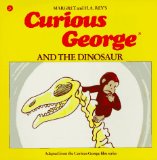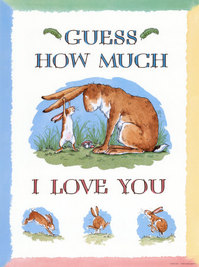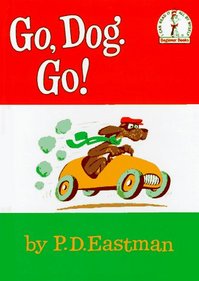Misadventures in kiddie lit (or, Why I might write a parody called 'Curious George Gets What's Coming to Him')

We have a very truncated board book version, for instance, of "Jack and the Beanstalk," and Lily seems to like its colorful illustrations, but the story drives me batty. Why? Because it might as well be called "The Shameless Goniff and the Beanstalk."
Things start off fine — Jack sells a cow for magic beans, his mother throws them out the window, and the giant beanstalk grows and reaches up through the clouds overnight. All well and good. But then Jack steals a bunch of treasure from the giant's castle and scoots down the beanstalk to safety. He later decides to go back up the beanstalk for more, because apparently, he's developed a taste for both theft and bling. But while trying to make off with an enchanted harp, the giant wakes up, and Jack barely makes it down the beanstalk in time to chop it down and send the giant plummeting to his death.
What exactly is the moral here? When you steal, make sure you get out of there quickly? And are we really expected to cheer for the boy who stole a bunch of stuff from a giant who was minding his own business, living atop the clouds, before having his home invaded? Who exactly is the victim in this story? (Because of my misgivings, I think this book will mysteriously be "lost" in the very near future, or at the very least replaced by a different, more-nuanced telling of the "Jack" story.)
Similarly, I have issues with some Curious George books. Not so much the early ones — though there are minor problems there, too. (George is kidnapped from his seemingly happy life in Africa and bagged up by the world's most inattentive pet owner, the Man in the Yellow Hat; George smokes a pipe before bed (?!); etc.). But generally, I'm fine with the original George: a well-intentioned monkey whose curiosity causes him to inadvertently stumble into trouble.
What I'm not fine with are some of the later Curious George books that are apparently based on a film series. In "Curious George and the Dinosaur," for instance, George goes to a museum with a class of kids; he wanders off from the group; he spots a giant dinosaur skeleton and climbs all over it; and although the museum director gets upset with George, the teacher defends George by saying that the monkey's "ride" on the dinosaur got the students interested in talking about the prehistoric animals.
George climbs down the skeleton to the kids' cheers and the director's forgiveness, so his bad bahavior is ultimately rewarded, and he's treated like a hero.
Oy. Where to begin.
Lily loves the original Curious George story — she asks for a banana each time we read it, since in the first illustration, George is swinging from the trees while eating one — so I'd pulled this stupid "Dinosaur" book off the local library's shelf, thinking she'd like a change-up. But as I read it to her, I felt like I wanted to shove the words right back into my mouth. Wandering off alone in a strange place? Climbing on a fragile museum exhibit, and being applauded for it? Yikes. (I was so annoyed by this that shortly thereafter, when prompted by my writing group to write a children's story, I thought of composing a parody titled "Curious George Gets What's Coming to Him.")
Of course, there have always been children's books with strange messages that you're not exactly sure you want to hand down. Shel Silverstein's "The Giving Tree" depicts selflessness and sacrifice in the name of love, yes, but perhaps to an unhealthy degree, since the tree is reduced to a stump by book's end. (Perhaps "The Codependent Tree" would be a more apt title?)
Check out this Sassy Gay Friend video that makes a similar point, in a much funnier way. (Note: video contains adult language.)
Robert Munsch's "Love You Forever," meanwhile, gets really creepy and weird when the mother's son grows up and moves across town, only to have his mother drive in the dark of night to his house, sneak through his window, crawl across the floor, and rock him, sleeping, in her arms. Boundaries, people. Boundaries.

Even Sam McBratney's "Guess How Much I Love You" — which I'd previously considered a sweet book and bought for countless couples who were having a baby — now seems troubling. Yes, it's lovely that a parent and child are enthusiastically declaring their love for each other; but because the father's size and physical dexterity necessarily exceeds his small son's, the father's trumping of each statement of affection, and his insistence upon having the last word on the matter - even though the son is asleep at the time — makes the tone of one-upsmanship far less appealing.
What strikes me about these later examples is that, in my mind, they seem to be written for, and have a far greater impact on, the parents more than the children. I can't tell you how many people have told me that they often cry when reading books like "The Giving Tree," "Love You Forever," and "Guess How Much I Love You?" to their child, and I don't think this is a coincidence.
The books, at their best, touch on the overwhelming sense of love that we mothers and fathers feel for our children, and this washes over us as we read a story to them about our willingness to sacrifice so much in their name, as well as our desire to help and protect them throughout their lifetime.
But from a colder, more objective distance from the material, I think we have to take a hard look at what lessons we're laying out for our children through books. Yes, they'll likely feel as we do if/when they become parents one day, but that's light years away for them, both temporally and intellectually. And until then, I can't help wondering what they're making of these odd messages. (I particularly worry about reading "The Giving Tree" to a young girl, since young women already too often feel compelled to hand over everything that makes them who they are in the name of romantic love.)
Am I overthinking all of this? Perhaps. It would hardly be the first time that's happened. And in our living room, there's a giant basket of books that I adore reading to Lily, without reservation (including "Corduroy," "The Mitten," and "The Foot Book"). But I must nonetheless confess that I've been surprised, as a new parent, by how I read and process children's books very differently now.

Sometimes, of course, I reverse my initial judgments. When I first read "Go, Dog, Go" to Lily, when she was a baby, I thought, "What a ridiculous, pointless book." Yet a few months before she turned two, she came to love this book, and I began to understand why. She was just getting a grasp on colors, objects, spatial relationships, and, well, she liked dogs. So she got noticeably excited when reading it because it was one of the first books where she felt like she was fully connecting with it and could understand most of the content. No small thing. Obviously, in that case, I needed to revise my previous assessment.
For after years and years of careful writing and reading, I know only too well the intense power of stories. They provide our earliest lessons, and they are a means of finding and making a place for ourselves in the larger world.
So although Lily is young, and thus guileless in regard to the sometimes-unsettling messages found in children's lit, I nonetheless want to do my best, while her world is largely filtered through me (and her father), to share with her stories that not only don't make me squirm, but make me feel like a have a fighting chance at raising a responsible, empathetic, productive, thoughtful person.
And just to be safe, I won't be taking Lily to any dinosaur exhibits anytime soon.
To read more, visit Jenn McKee's An Adequate Mom blog. Jenn McKee is the entertainment digital journalist for AnnArbor.com. Reach her at jennmckee@annarbor.com or 734-623-2546, and follow her on Twitter @jennmckee.


Comments
jerrit tan
Sat, Oct 16, 2010 : 1:57 p.m.
What kinds of stories you want to share with kids depend on what kinds of characteristics you believe to be most important to leading a successful happy life. If you want your kids to be obedient and always follow the rules, then Curious George may not be right for them. But if you want your kids to be okay with taking risks (and people sometimes do get rewarded and applauded like George when they disobey and take risks), then I think it's okay to look up to George for his curiosity and disobedience.
hypsi
Sat, Sep 18, 2010 : 9:28 a.m.
Too much over-analyzing can be detrimental to children. Let it go.
amsims
Fri, Sep 17, 2010 : 1:10 p.m.
I couldn't agree more with your thoughts on "The Giving Tree," "Love You Forever" and "Guess How Much I Love You." These are all books I was given when my kids were born and that I got rid of as soon as possible! It's hard enough to figure out parent/kid boundaries with out such creepy, sentimentalized and inappropriate role models. Another theme that bothers me is the personification of toys, as in the "Toy Story" movies or "The Velveteen Rabbit." It's hard enough to keep possessions pared down to reasonable levels without kids feeling sad about the potential hurt feelings of every outgrown stuffed animal. I think its' okay when kids give their toys personalities on their own, but the treatment of this idea in the hands of adult writers feels almost exploitative.